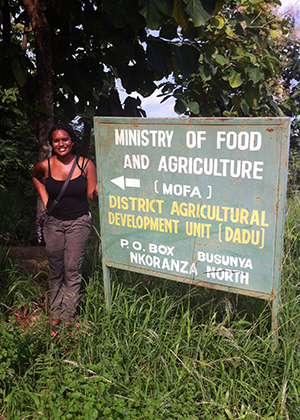
When Melanie Allen, MA-SID’15, first arrived at Heller to study in the Sustainable International Development program, her advisor, Joshua Ellsworth, said she was already focused on the vital role that scientific assessment plays in environmental conservation. “I felt she had a strong knowledge base, and she’s been open enough to gain the skills and outlook over the last year to have a better chance to translate that technical understanding into concrete change,” Ellsworth says.
Allen relies on that cause-and-effect perspective in her current practicum work with the African Cashew initiative, which supports rural cashew farmers in West Africa. The project helps farmers improve the productivity of their cash crop so they can better compete in the international market.
Allen’s impact and interest in the area of climate adaptation and community-based conservation in African and Caribbean countries caught the attention of the Robert and Patricia Switzer Foundation, which has named her one of 20 Switzer Environmental Fellows for 2014. The program recognizes emerging leaders who are pursuing graduate degrees and driving positive environmental change in their careers. In being named a Switzer Fellow, Allen receives a $15,000 award that is helping to fund her work in West Africa.
“The Switzer Fellowship has provided me with the opportunity to become an active contributor to my field of study in a manner unlike other traditional, academic experiences,” Allen says. “As the fellowship has a big emphasis on professional development, it has given me the chance to enhance my leadership skills that are critical to effectively communicating and implementing environmental change.”
Allen’s drive for change is currently centered on her practicum work with the cashew farmers in Burkina Faso. That experience is reflected in the theme of her master’s paper, which focuses on the role that public and private partnerships can play in agricultural value chain development initiatives. She says the Switzer Fellowship program resonates with the goals of the SID program.
“The Switzer Fellowship understands that to solve our global sustainable development challenges, an interdisciplinary approach is critical,” she says. “Just like SID, it recognizes that focusing on one pillar is not enough. The Switzer Fellowship brings together ecologists, policy makers, agriculture specialists, economists, urban planners, and much more, all to one table, to have critical discussions that often lead to further collaboration.”
As for her current collaborations, Allen continues to make an impression on advisor Joshua Ellsworth, who says her distinguished work in the classroom and the field makes her very deserving of the Switzer Fellowship. “Over the past 18 months, while at SID and in her fieldwork on cashew production in Burkina Faso, I have witnessed Melanie widen her approach to include a deep understanding of social and economic conditions,” Ellsworth says. “She knows how to apply what she’s learned to what she’s trying to accomplish, and she’s already making a difference.”
